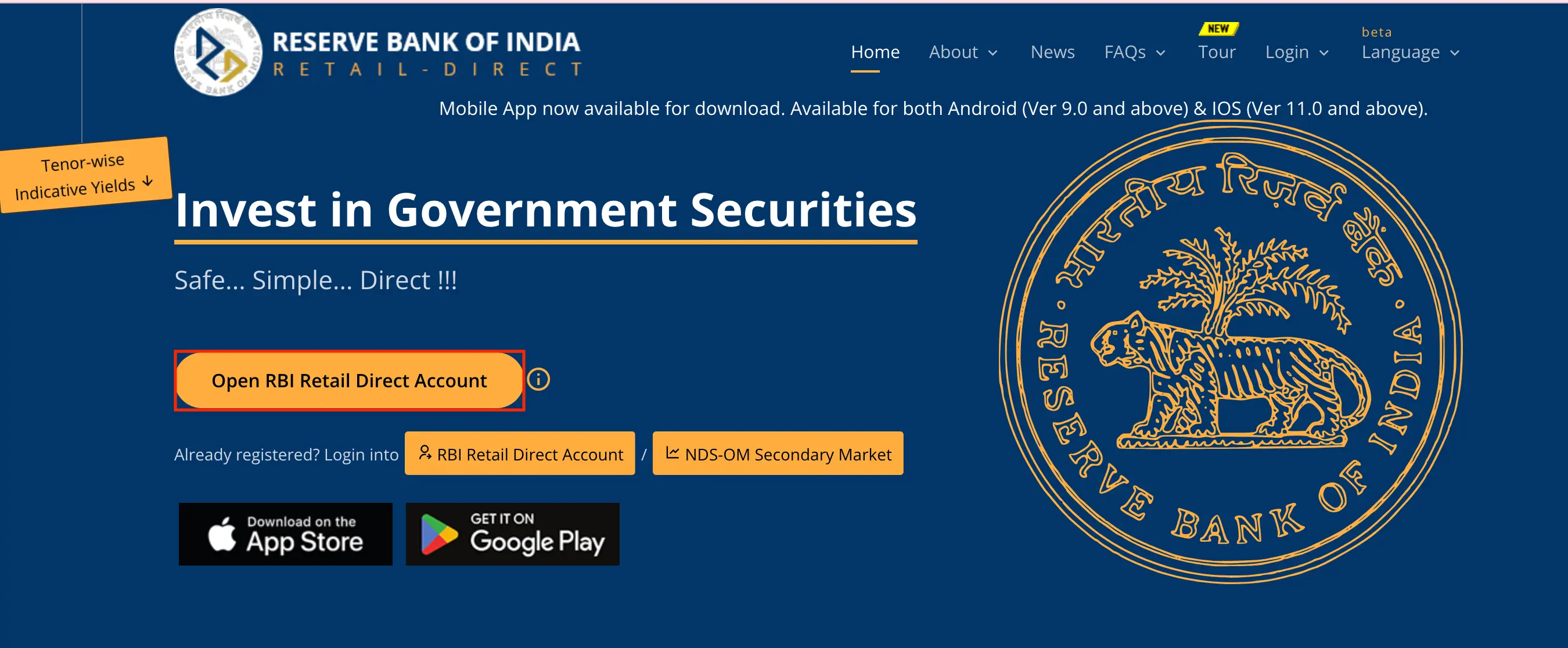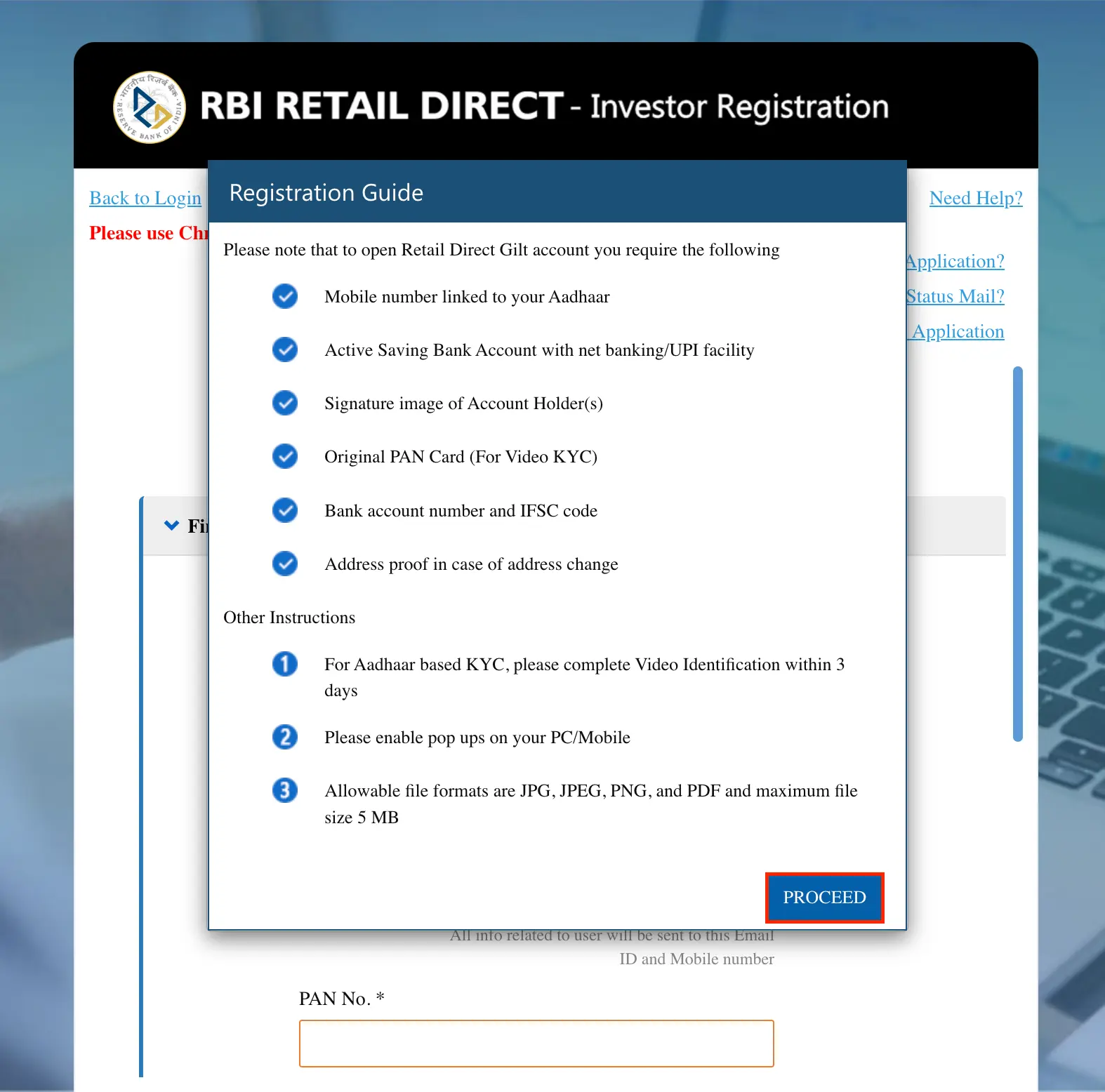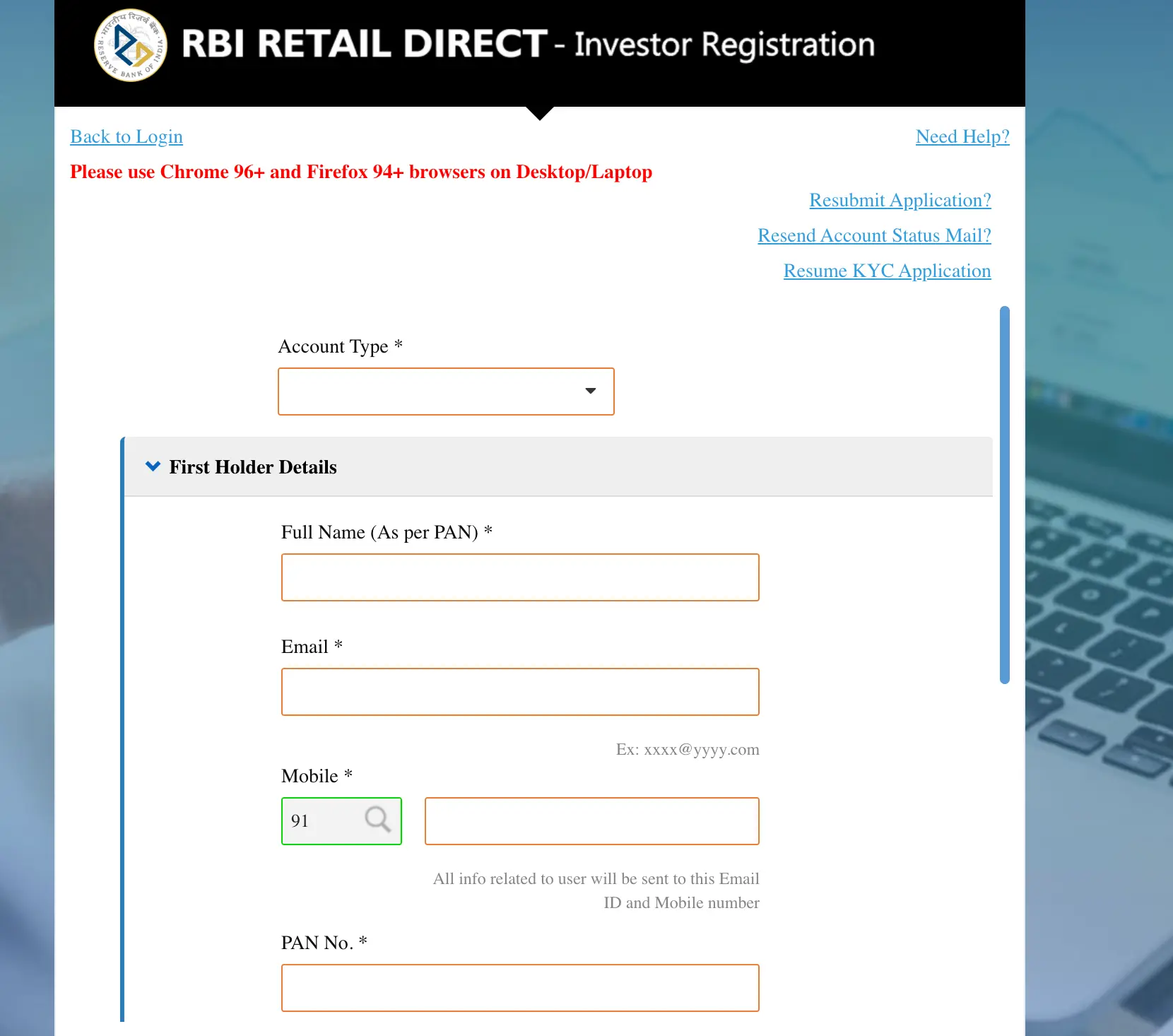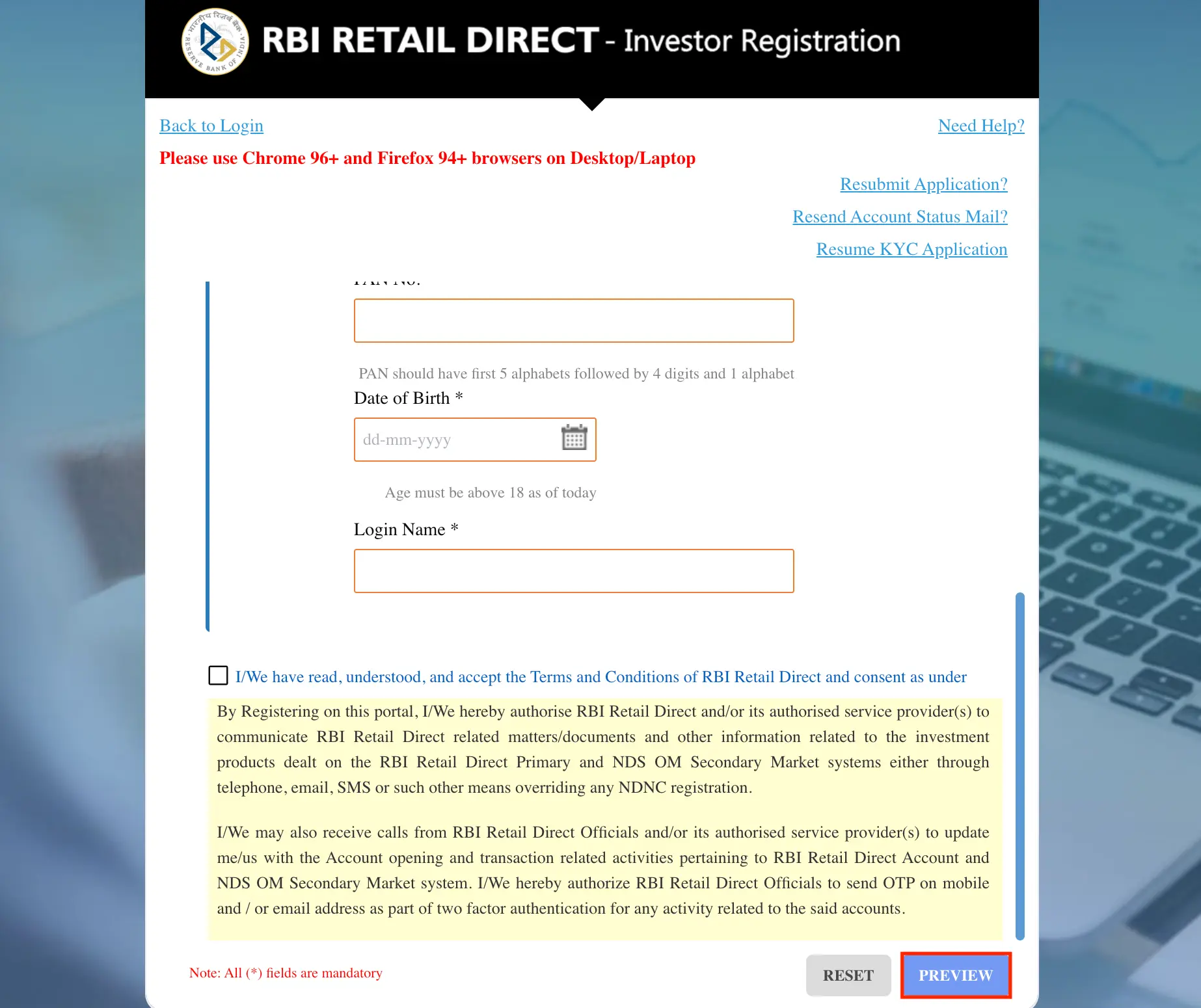The RBI Retail Direct is a platform launched by the Reserve Bank of India to allow investors to buy and sell government securities (G-Secs) online easily. This platform simplifies investing in government securities, making it easier for common people to invest without intermediaries like brokers or financial institutions. RBI Retail Direct portal allows you to open a Retail Direct Gilt (RDG) account, through which you can invest in government securities that offer assured and secure returns.
RBI Retail Direct allows individual investors to invest directly in government securities, including T-Bills, bonds, and Sovereign Gold Bonds, through an easy online platform. Starting with a minimum of ₹10,000, it offers secure, cost-effective investments with flexible options and no intermediaries like brokers, banks, or financial institutions.
Table of Contents:
- ⇾ Understand RBI Retail Direct Interest Rates
- ⇾ Eligibility to Open RBI Retail Direct Account
- ⇾ Document Required For Retail Direct Account
- ⇾ RBI Retail Direct Key Features
- ⇾ RBI Retail Direct Schemes
- ⇾ Benefits of RBI Retail Direct Scheme
- ⇾ Minimum Investment for RBI Retail Direct Scheme
- ⇾ Limitations of the RBI Retail Direct Scheme
- ⇾ Steps to Start Investing with RBI Retail Direct
- ⇾ Frequently Asked Questions
Understanding RBI Retail Direct Interest Rates
The RBI direct interest rates will depend on the schemes and the tenure that an investor chooses. The interest rates are attractive to encourage investment among people and to ensure that they get good returns. Schemes with a longer tenure will give you higher interest rates, while schemes with a shorter tenure will give you a lower interest rate.
Currently, the interest rate for Floating Rate Savings Bonds (FRSB) 2020 (T) is 8.05% for July 01, 2024, and December 31, 2024. You can easily check the interest rates of the schemes you want to invest in from the RBI retail direct portal.
Are you looking for a personal loan?
Eligibility to Open RBI Retail Direct Account
There are certain eligibility criteria that investors must meet to open an RBI Retail Direct Gilt account, these are:
- They must have a rupee savings bank account in India.
- Permanent Account Number (PAN) from the Income Tax Department.
- Any Officially Valid Document (OVD) like an Aadhaar Card, Voter’s ID, Driver’s Licence, etc. for KYC
- Valid email address and registered mobile number.
- Non-resident investors are eligible if permitted to invest in Government Securities under FEMA (Foreign Exchange Management Act).
- Account Type: Can be opened as individual or jointly with another eligible retail investor.
Document Required For Retail Direct Account
Minimal documents are required to open the retail direct RBI account RDG, these are:
- Mobile Number that is linked to Aadhaar.
- Active Bank account details with net banking and UPI facilities.
- Account holder’s signature image.
- PAN card for video KYC
- Address proof
- Aadhaar card for KYC
- Files are allowed in JPG, JPEG, PNG, and PDF with a maximum size of 5MB.
RBI Retail Direct Key Features
RBI retail direct offers investors attractive features, these are:
- Minimum Investment Amount: Anyone can start investing through the RBI direct portal with as little as ₹10,000.
- Direct Access: Investors can directly invest in government securities like bonds, securities, and treasury bills, without needing a broker or financial institutions.
- Online Platform: The entire process, from opening the Retail Direct Gilt account to purchasing and selling, is done online through the secure RBI Retail Direct platform.
- Variety: Investors can choose from various types of government investment schemes like Government of India Treasury Bills, Sovereign Gold Bonds, Government of India dated Securities, and State Development Loans.
- No Fees: There are no charges for opening or maintaining the account.
- Safe and Secure: Investments are backed by the government, offering a safe investment option with stable returns.
RBI Retail Direct Schemes
RBI Retail Direct offers several schemes that investors can choose from based on their financial goals. These retail direct schemes are given in detail below:
Government of India Treasury Bills (T-Bills)
Treasury Bills (T-Bills) are short-term debt instruments issued by the Government of India to meet its short-term borrowing needs. These bills are available in three tenures: 91-days, 182-days, and 364-days.
T-Bills are issued at a discount and redeemed at face value, allowing investors to earn through the difference. These Government of India Treasury Bills that can be invested through the RBI Direct platform are safe investment options as they are backed by the government. They are a great option for investors seeking short-term, low-risk options for saving surplus funds.
Sovereign Gold Bonds
Sovereign Gold Bonds (SGBs) are government-backed securities issued in grams of gold. They offer an alternative way to invest in gold without holding physical gold, providing them with a secure and profitable option for investing in gold.
SGBs are issued by the Reserve Bank of India (RBI) on behalf of the Government of India and offer a fixed interest rate of 2.5% p.a. along with the benefit of price appreciation of gold. These bonds are an excellent option for those who want to invest in gold without the hassles of storage and safety concerns associated with physical gold.
Government of India Dated Securities
Government of India Dated Securities (Dated G-Secs or Government Bonds) are RBI retail direct schemes that allow for long-term investment issued by the central government. These bonds have a fixed maturity period of one year or more, providing a stable and secure investment option for investors seeking long-term returns. The government uses these bonds to borrow funds for various public projects, and the bonds offer periodic interest payments. Dated G-Secs are considered one of the safest options for investment as they are fully backed by the Government of India.
Government of India Dated Securities
Government of India Dated Securities (Dated G-Secs or Government Bonds) are RBI retail direct schemes that allow for long-term investment issued by the central government. These bonds have a fixed maturity period of one year or more, providing a stable and secure investment option for investors seeking long-term returns. The government uses these bonds to borrow funds for various public projects, and the bonds offer periodic interest payments. Dated G-Secs are considered one of the safest options for investment as they are fully backed by the Government of India.
State Development Loans (SDLs)
State Development Loans (SDLs) are long-term debt instruments issued by state governments in India to meet their budgetary requirements. SDLs are similar to government bonds but are issued by individual state governments. They are generally issued for a maturity period of one year or more, and investors receive periodic interest payments. SDLs are considered low-risk investments as they are backed by the respective state governments, making them an attractive option for conservative investors looking for stable returns.
Don't know your credit score? You can find out for free!
Benefits of RBI Retail Direct Scheme
The RBI Retail Direct Scheme offers several advantages for investors, making it easier to access and invest in government securities:
- Direct Access to Government Securities: Retail investors can directly invest in government securities, such as T-Bills, G-Secs, SDLs, and SGBs, without intermediaries.
- User-Friendly Platform: The online portal allows easy registration, investment, and management of securities, making the process smooth and hassle-free.
- Secure and Low-Risk Investment: Investments in government securities are backed by the Government of India, providing a safe, risk-free option with assured returns.
- No Brokerage or Fees: Investors can invest in government securities without any intermediary charges, making it cost-effective and accessible to a wide range of individuals.
- Flexibility: Retail investors can participate in both the primary and secondary markets, offering flexibility in managing and diversifying their investment portfolios.
- Encourages Financial Inclusion: The scheme promotes broader participation by making government securities more accessible to individual investors.
Minimum Investment for RBI Retail Direct Scheme
The RBI Retail Direct scheme offers affordable investment options with a minimum investment of ₹10,000. The low investment amount makes investing attractive to many individuals including common people. Encouraging them to start saving towards their financial goals.
Limitations of the RBI Retail Direct Scheme
While investing in RBI Direct is a great opportunity to grow your wealth, it does have a few limitations, these are:
- Limited Liquidity: Government securities generally have longer maturity periods, which can limit liquidity.
- No Professional Management: Investors are responsible for selecting and managing their investments, which may not be ideal for those without financial expertise.
- Interest Rate Risk: The value of government bonds can fluctuate based on changes in interest rates, which could impact returns, especially if sold before maturity.
- No Immediate Access to Funds: There may be restrictions on early withdrawal, depending on the type of security and its lock-in period.
- Limited Diversification: Investing in individual government securities may not offer the same level of diversification as mutual funds, leading to concentrated risk.
- Taxation: Interest income from government securities is fully taxable, potentially reducing overall returns.
Steps to Invest with RBI Retail Direct
To start investing with RBI retail direct, you can follow the steps below:
Step 1: Visit the official RBI Retail Direct portal - https://rbiretaildirect.org.in
Step 2: Click on Open RBI Retail Direct Account.

Step 3: You will see the ‘Registration Guide’, read it carefully and click on ‘Proceed’.

Step 4: Enter the account type, full name as per PAN, email address, mobile number, PAN number. Date of Birth and Login name.

Step 5: Read and accept the Terms and Conditions, then preview your application.

Step 6: You can then follow RBI’s Know Your Customer (KYC) guidelines for identity verification.
Step 7: After successful KYC, a Retail Direct Gilt (RDG) account will be opened.
Step 8: Log in to your account and you will be able to invest in the government securities of your choice.
Avail an instant loan in a few simple steps!
You can also check other related topics of RBI Bond
Did you know, you can get a loan against your investments?
Know more about loans against different assets from the links below:
Read More
Read Less
Frequently Asked Questions
The RBI Retail Direct Scheme allows individual investors to buy and sell government securities directly, offering secure investment options online.
Indian investors with a savings account, PAN, valid KYC, email ID, and mobile number. NRIs can also invest if permitted under FEMA regulations.
Investors can buy Treasury Bills, Government Bonds, State Development Loans (SDLs), and Sovereign Gold Bonds (SGBs).
Register on the RBI Retail Direct portal, complete your KYC, and once your account is activated you can start investing in G-Secs.
PAN, address proof, valid ID for KYC, email, and registered mobile number are required for opening an RDG account.
No, there are no charges for opening or maintaining an RDG account under the RBI Retail Direct Scheme.
You can participate in primary market auctions or trade government securities on the secondary market through the RBI Retail Direct platform.
The minimum investment is ₹10,000 and there's no maximum limit, allowing flexibility based on the investor’s financial goals.
KYC verification is done online during registration using PAN, address proof, and other necessary documents.
Yes, you can nominate a person while opening the RDG account or update the nomination later.
Display of trademarks, trade names, logos, and other subject matters of Intellectual Property displayed on this website belongs to their respective intellectual property owners & is not owned by Bvalue Services Pvt. Ltd. Display of such Intellectual Property and related product information does not imply Bvalue Services Pvt. Ltd company’s partnership with the owner of the Intellectual Property or proprietor of such products.
Please read the Terms & Conditions carefully as deemed & proceed at your own discretion.






 Rated 4.5 on Google Play
Rated 4.5 on Google Play 10M+ App Installs
10M+ App Installs 25M+ Applicants till date & growing
25M+ Applicants till date & growing 150K+ Daily Active Users
150K+ Daily Active Users